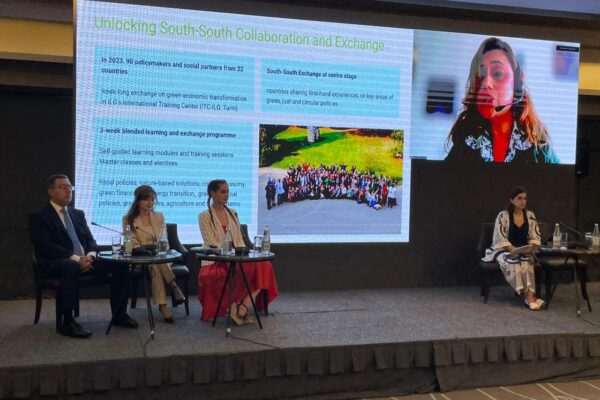
As Azerbaijan is hosting COP29, participants are expected to learn from each other and to benefit from the exchanges at different stages of preparations for COP29. The synergy in preparations is crucial to ensure a holistic approach. The Earth’s ability to sustain human society depends on nine primary “planetary boundaries,” or global systems that are key indicators of its health. Of these nine limits, humans have blown past six: climate change, biosphere integrity (which includes biodiversity), freshwater availability, land use, nutrient pollution and novel entities (meaning human-made pollution, such as microplastics and radioactive waste). The National Determined Contributions (NDCs) are where countries set targets for mitigating the greenhouse gas emissions that cause climate change and for adapting to climate impacts. The plans define how to reach the targets, and elaborate systems to monitor and verify progress so it stays on track.
To support countries in their preparations for COP29, the ILO has launched the project “Promoting a gender-responsive just transition through knowledge-sharing and peer learning under South-South and Triangular Cooperation (SSTC) for COP29 (Azerbaijan) and COP30 (Brazil)”. Under the project ILO constituents (the government and social partners) are expected to learn from each other and to benefit from the exchanges with countries at different stages of development.
The benefits of SSTC include fostering mutual learning and collaboration among countries facing similar challenges and opportunities. This cooperative approach leverages the unique experiences and innovations of diverse nations, enhancing the capacity to implement effective gender-responsive strategies. Moreover, SSTC helps in building stronger partnerships and networks that can drive sustainable development and resilience against climate change. By engaging in SSTC, countries can share best practices, enhance policy coherence, and collectively work towards achieving the goals set for COP29 and beyond.
In the framework of the project on 24-25 July 2024 the workshop was organized under the United Nations 29 Climate Conversations: The Road to the COP29 and the ILO EUROPE and Central Asia Regional Network on Enterprise Development and Just Transition. The workshop convened national tripartite constituents and other relevant stakeholders of Azerbaijan and international practices for subsequent preparation of position papers by the constituents to contribute to COP29. The number of workshop participants exceeded 60, including from Government, employers’ and workers’ organizations, ILO technical specialists, experts and resource people.
During the meeting, Deputy Minister of Labour Mr. Anar Aliyev discussed the implementation of national strategies and employment reforms aimed at social and economic development. He emphasized the importance of integrating social partners’ principles into government decisions and highlighted Azerbaijan’s commitment to green initiatives, gender equality, and the COP29 conference. Mrs. Vladanka Andreeva, United Nations Resident Coordinator Azerbaijan, focused on the ramifications of climate change on social insurance, CO2 emissions mitigation, and the UN’s efforts to incorporate green job creation into its policies and how SSTC approach can help with this. She also mentioned the importance of trade unions’ role in environmental strategies and the upcoming capacity-building activities in 2024. Mr. Javanshir Alkhasov from Trade Unions confederation of Azerbaijan addressed the impact of climate change on entrepreneurs, emphasizing the need for awareness of green economy requirements and the significance of a joint transition approach.
Various ministries also provided updates on their initiatives. The Ministry of Agriculture highlighted efforts to engage women in economic contributions, particularly in agriculture, through training and machinery provision, emphasizing climate-resilient practices. The Ministry of Energy discussed Azerbaijan’s actions to mitigate climate change impacts, including the development of green energy corridors, renewable energy projects, and hydrogen production. The Ministry of Ecology outlined measures to address environmental changes, such as biodiversity protection and early warning systems for agriculture. Other stakeholders, including the Sea Trade Port and the Ministry of Labor, emphasized the importance of gender equality, employment reforms, and sustainable agriculture practices. Discussions also covered the role of trade unions in promoting gender equality and addressing climate-related employment challenges.

